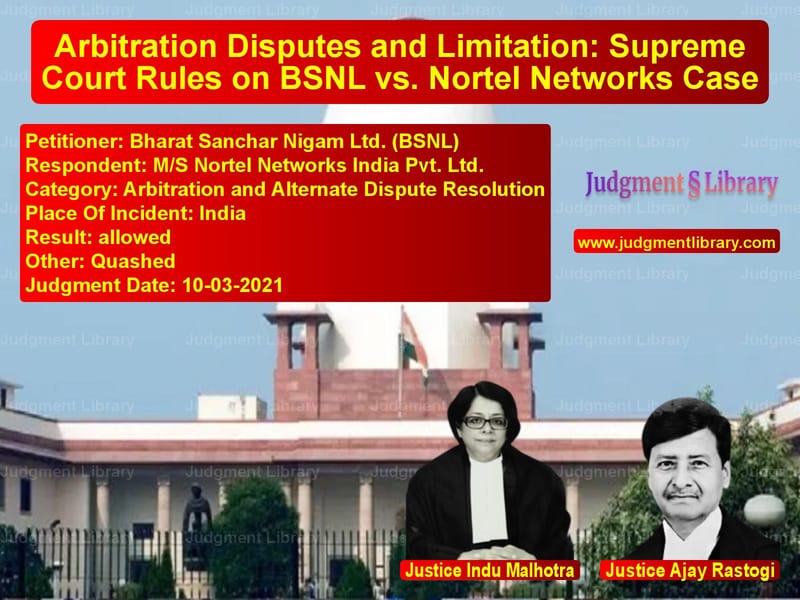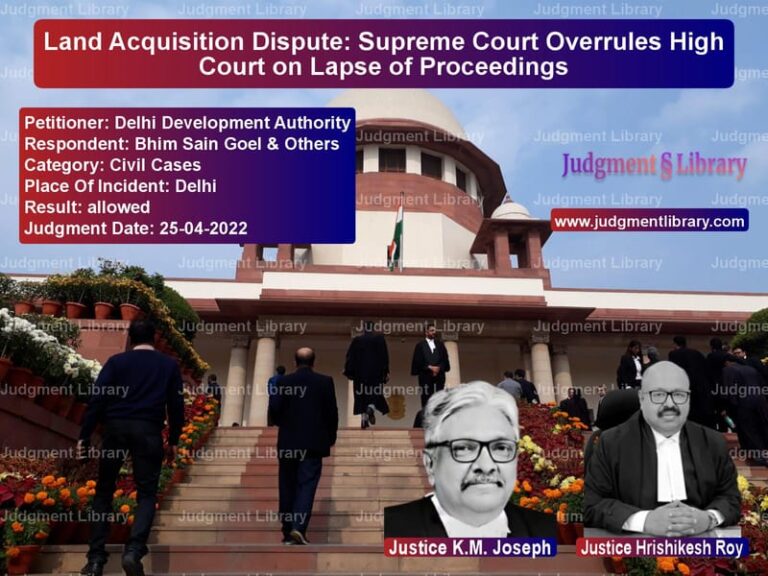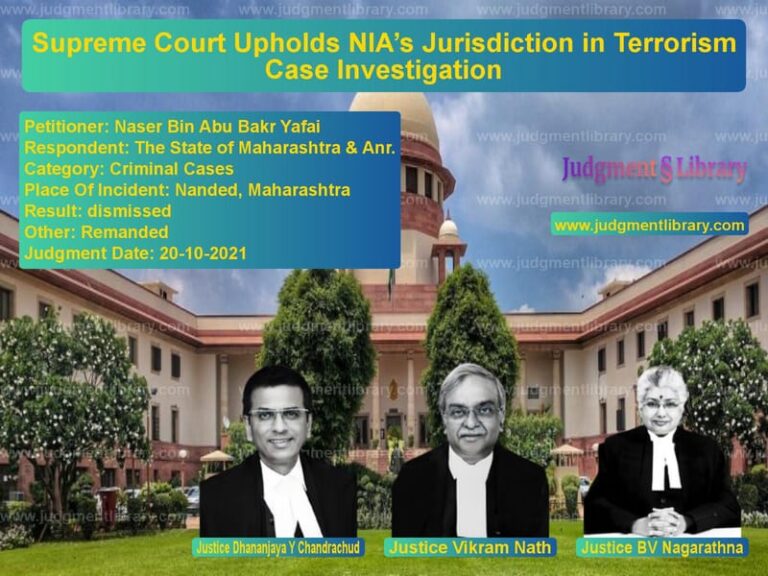Arbitration Disputes and Limitation: Supreme Court Rules on BSNL vs. Nortel Networks Case
The case of Bharat Sanchar Nigam Ltd. (BSNL) vs. M/S Nortel Networks India Pvt. Ltd. raised two significant legal issues regarding arbitration: (i) the limitation period for filing an application under Section 11 of the Arbitration and Conciliation Act, 1996, and (ii) whether courts can refuse arbitration where claims are ex facie time-barred.
Background of the Case
The dispute originated when BSNL awarded a purchase order to Nortel for planning, engineering, supply, insulation, testing, and commissioning of a GSM-based cellular mobile network. After the completion of work, BSNL withheld an amount of ₹99.70 crores, citing liquidated damages and other levies.
On 13.05.2014, Nortel demanded payment, but BSNL rejected the claim on 04.08.2014. Nortel remained inactive for over five years and then, on 29.04.2020, invoked the arbitration clause, requesting the appointment of an independent arbitrator. BSNL rejected the request, arguing that the claim was time-barred under Section 43 of the Arbitration Act.
Nortel approached the Kerala High Court under Section 11 of the Arbitration Act, which ruled in favor of referring the dispute to arbitration. BSNL’s review petition was dismissed, prompting an appeal to the Supreme Court.
Arguments of the Parties
Petitioner’s Arguments (BSNL):
- The cause of action arose on 04.08.2014 when BSNL rejected Nortel’s claim.
- Nortel’s invocation of arbitration in 2020, after 5.5 years, made the claim legally stale and unenforceable.
- Although limitation issues are generally for the arbitral tribunal, courts must reject arbitration when claims are ex facie time-barred.
The Supreme Court noted BSNL’s argument: “The Court at the referral stage can interfere only when it is manifest that the claims are ex facie time-barred and dead, or there is no subsisting dispute.”
Respondent’s Arguments (Nortel):
- The Arbitration Act’s 2015 amendment limits judicial review at the Section 11 stage to determining the “existence” of an arbitration agreement.
- Limitation should be determined by the arbitral tribunal under the principle of kompetenz-kompetenz.
- The notice of arbitration issued on 29.04.2020 was within the time allowed for an application under Section 11.
Supreme Court’s Analysis
The Supreme Court addressed two primary issues:
1. Limitation for Filing an Application Under Section 11
The Court ruled that Article 137 of the Limitation Act, 1963 applies to Section 11 applications, establishing a three-year limitation period from the date the right to apply accrues.
It emphasized:
- “The period of limitation for filing an application under Section 11 would be governed by Article 137 of the First Schedule of the Limitation Act, 1963.”
- “The Parliament may consider amending Section 11 to provide a specific period of limitation, aligning with the Arbitration Act’s objective of expeditious dispute resolution.”
2. Whether the Court Can Refuse Arbitration When Claims Are Ex Facie Time-Barred
The Supreme Court ruled that courts should generally refer disputes to arbitration unless it is manifestly clear that the claims are deadwood and time-barred.
The Court clarified:
- “The issue of limitation is an issue of admissibility and not jurisdiction, and must be decided by the arbitral tribunal.”
- “In rare and exceptional cases, where the claims are ex facie time-barred, and it is manifest that there is no subsisting dispute, the Court may refuse to make the reference.”
Final Judgment
The Supreme Court ruled in favor of BSNL and set aside the High Court’s order, refusing to refer the dispute to arbitration. It concluded:
- Since Nortel’s claims were rejected on 04.08.2014, its arbitration notice in 2020 was ex facie time-barred.
- “The present case is a case of deadwood / no subsisting dispute.”
- “Unless there is a pleaded case justifying an extension of limitation, courts must reject claims that are ex facie barred.”
This ruling reinforces the importance of adhering to limitation laws in arbitration and provides clarity on the scope of judicial review under Section 11.
Petitioner Name: Bharat Sanchar Nigam Ltd. (BSNL).Respondent Name: M/S Nortel Networks India Pvt. Ltd..Judgment By: Justice Indu Malhotra, Justice Ajay Rastogi.Place Of Incident: India.Judgment Date: 10-03-2021.
Don’t miss out on the full details! Download the complete judgment in PDF format below and gain valuable insights instantly!
Download Judgment: bharat-sanchar-nigam-vs-ms-nortel-networks-supreme-court-of-india-judgment-dated-10-03-2021.pdf
Directly Download Judgment: Directly download this Judgment
See all petitions in Arbitration Awards
See all petitions in Dispute Resolution Mechanisms
See all petitions in Contract Disputes
See all petitions in Enforcement of Awards
See all petitions in Commercial Arbitration
See all petitions in Judgment by Indu Malhotra
See all petitions in Judgment by Ajay Rastogi
See all petitions in allowed
See all petitions in Quashed
See all petitions in supreme court of India judgments March 2021
See all petitions in 2021 judgments
See all posts in Arbitration and Alternate Dispute Resolution Category
See all allowed petitions in Arbitration and Alternate Dispute Resolution Category
See all Dismissed petitions in Arbitration and Alternate Dispute Resolution Category
See all partially allowed petitions in Arbitration and Alternate Dispute Resolution Category







